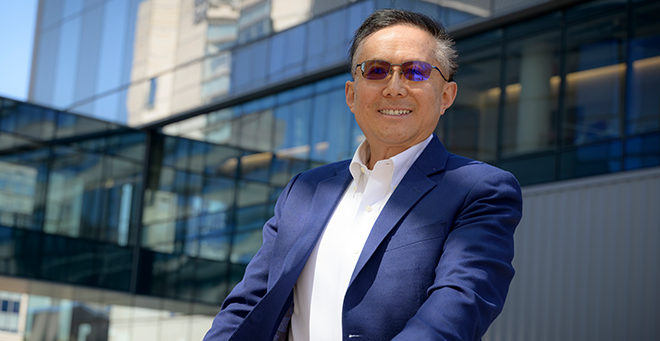
Photo: Hallie Leo
UMass Chan Medical School will host faculty and students from two Ugandan universities starting in early 2026 as part of an effort to expand the global cell and gene therapy network and build capacity for an international response to the HIV epidemic.
Jennifer E. Adair, PhD, vice chair and professor of genetic & cellular medicine and associate director of the Horae Gene Therapy Center, is a co-principal investigator and recipient of a $1.27 million National Institutes of Health Fogarty International Center Global Infectious Disease research grant.
The grant will support cell and gene therapy education and research training for fellows from Ugandan institutions at UMass Chan over a five-year period. The goal of the project is to create a foundation for cell and gene therapy policy and advocacy and develop a center of excellence to use these therapies for a HIV cure in Uganda and sub-Saharan Africa.
“These institutions are really in a unique position. They have exceptional basic and clinical research in the HIV space. They’re just lacking some of the base technology experience for genetic medicine to be applied. That’s a gap we can close and that’s what this grant aims to do,” Dr. Adair said. “What we need is workforce capacity—PhDs, masters, postdoctoral fellows, trained clinicians and undergraduate students—getting exposure to understanding gene therapy as part of their base curriculum.”
According to Adair, in the data used to design gene therapies, genomes from sub-Saharan Africa represent less than 1 percent of all genomes. In 2021, according to the Joint United Nations Programme on HIV/AIDS, nearly half of all new HIV cases and AIDS-related deaths happened in sub-Saharan Africa.
“This project is about capacity building in cell and gene therapy and genetic medicine. There are many countries that want to be part of gene therapy development, and should be, especially in sub-Saharan Africa. These people represent the most diverse human genome because they’re the most ancient human genome,” Adair said.
Three faculty members from Makerere University and Mbarara University of Science and Technology, both in Uganda, will participate in the American Society of Gene and Cell Therapy annual meeting in Boston in May and will remain in Massachusetts after the meeting for as long as four weeks to interact, learn and collaborate in the labs of UMass Chan scientists.
“The faculty from these institutions will be introduced to some of the technology we use in genetic medicine; CRISPR tools; viral vectors, including AAV and integrating viral vectors; lipid nanoparticles; and more,” Adair said.
In subsequent years, UMass Chan will host six master’s students, three PhD students and two postdoctoral fellows from Uganda who will be funded by the grant.
“This project will give these universities the opportunity to launch research locally and secure government support and funding. In scientific research, you always need to demonstrate that you can ask good questions and answer them and bring new knowledge to the field. This is giving these researchers the opportunity to take the lead in that, leveraging their own patient population to do it,” Adair said.
Adair joined UMass Chan in early 2025. A world-renowned scientific leader in genetically modified cell therapies for genetic, malignant and infectious diseases, Adair was most recently associate professor in the Translational Science and Therapeutics Division at the Fred Hutch Cancer Center and the University of Washington.
Cissy Kityo Mutuluuza, PhD, MS, executive director of the Joint Clinical Research Center in Uganda is co-investigator on the project. Adair and Dr. Mutuluuza founded the Global Gene Therapy Initiative in 2020 to provide greater opportunities for low- and middle-income countries to access gene therapy research.
In September, Adair joined three other members of the Global Gene Therapy Initiative and participated in the inaugural Summits for Sickle Cell 2025, benefitting Sickle Forward, an organization dedicated to combating sickle cell disease in Africa. Adair and colleagues attempted to scale three 14,000+ ft. Colorado mountain peaks in three days to raise $500,000 for screening and hydroxyurea access in sub-Saharan Africa.


